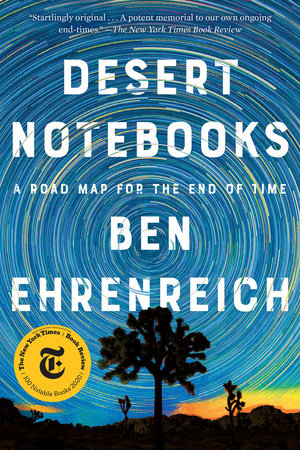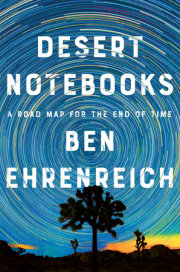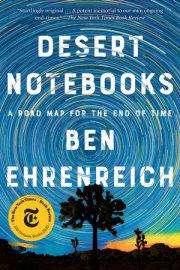A New York Times Notable Book
Editors' Choice, The New York Times Book Review
An Amazon Best Book of the Month in Nonfiction
One of New York Public Library's Best Books of the Year
"Startlingly original . . . Out of love and despair (where else does art come from?), he has built a potent memorial to our own ongoing end-times." --William Atkins, The New York Times Book Review
"It's my kind of modern adventure story, relying on introspection, critical thinking and creativity." --Stacey Lewis, City Lights Books, The Wall Street Journal
"Writing from deserts across the Southwest--whose tenacious landscape is dotted with Army bases and urban outposts--he draws on Mayan creation myths, anthropological accounts of the decimated Sioux, and Presidential tweets to chronicle humankind's destructive nature. The breadth of reference lends perspective to our continuing struggle to achieve sustainability: as Ehrenreich writes, 'We are not the first people to believe we are living at the end of time.'" --The New Yorker
"In his timely new book, Desert Notebooks: A Road Map for the End of Time, a hybrid memoir, travelogue and metaphysical inquiry, Ben Ehrenreich explores how our perception of time changes in a crisis--a crisis like climate change, or COVID-19 . . . [He] fuses the personal with the political in reflections on climate change, the president's disaster du jour and his extensive reading in the desert." --Jim Ruland, Los Angeles Times
"Confessional, contemplative, intellectually adventurous, Ben Ehrenreich's Desert Notebooks: A Road Map for the End of Time is a worthy addition to the library of American aridity . . . Ehrenreich's intellectual explorations are challenging but never pretentious . . . [He] shows that deserts can make us wise in new ways." --Peter Fish, San Francisco Chronicle
"A book about the apocalypse shouldn't be uplifting; but somehow this book manages to be, while at the same time remaining very unflinching. Ehrenreich writes about a lot more than the desert in this book. He's weaving a tale for how we got here. But after you read it, you won't be able to stop thinking about where we are headed." --Chris Schluep, Amazon Book Review's Best Nonfiction of the Month
"A tapestry of aphorisms and personal essays, colonial history and ancient legends . . . Desert Notebooks is a searing indictment of the ascendance of white supremacy over more than 200 years and how the orthodoxy of capitalism has set us on a collision course with climate change." --Jonathan Hahn, Sierra
"Essential reading about the place and the rest of the world as it relates to it . . . The mix of science, myth, anecdotes, and a profound love for the terrain produces one of my favorite reads of the spring thus far, if not the year." --Chris La Tray, Buzzfeed
"Ehrenreich's good for a grand insight . . . With minimal exertion, he skips across far-distant geographies, cosmogonies, and temporalities, eyes peeled for the just-right detail, the flecks of cultural glue, and any mention whatsoever of his constant guide, the owl. When he makes a connection, it's for all of us." --Jason Kehe, Wired
"Desert Notebooks is a strong contender for my best book of the year. Author Ben Ehrenreich offers a profound and lyrical meditation on history, nature, myth, and our changing concepts of time against the backdrop of our ongoing political upheaval and a climate crisis that isn't going away." --Tom Beans, The Weekly Source
"A remarkable work of cultural history and environmental polemic, at once a stirring portrait of the desert in its purest form and a lament for what's been done to it in the name of progress." --Mark Athitakis, Inside Hook
"Ehrenreich is a bold choreographer, skipping from black holes and Mayan myths to the 'breathtaking racism' of Hegel and mystic wheels in the stories of Borges . . . He skips with intent, each apparently random insight sparking off the next . . . Engrossing." --Barbara Kiser, Los Angeles Review of Books
"An urgent plea to revise our relationship to the planet, each other, and time . . . Lyrical, freshly observed . . . Well-informed and -rendered, passionate reflections on humanity's prospects." --Kirkus Reviews (starred review)
"Exciting and illuminating . . . Very few writers have addressed the current planetary crisis as powerfully and insightfully as Ehrenreich does. The book is extraordinary as much for the rigor of its thinking as for the manner of its writing." --Amitav Ghosh









